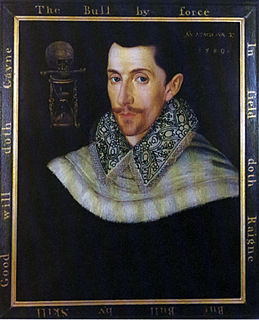
A spinet is a smaller type of harpsichord or other keyboard instrument, such as a piano or organ.

The Fitzwilliam Virginal Book is a primary source of keyboard music from the late Elizabethan and early Jacobean periods in England, i.e., the late Renaissance and very early Baroque. It takes its name from Viscount Fitzwilliam who bequeathed this manuscript collection to Cambridge University in 1816. It is now deposited in the Fitzwilliam Museum at Cambridge. Although the word virginals or virginal is used today to refer to a specific instrument similar to a small, portable harpsichord, at the time of the book the word was used to denote virtually any keyboard instrument including the organ.
Thomas Tomkins was a Welsh-born composer of the late Tudor and early Stuart period. In addition to being one of the prominent members of the English Madrigal School, he was a skilled composer of keyboard and consort music, and the last member of the English virginalist school.
Giles Farnaby was an English composer and virginalist of the Renaissance and Baroque periods.

During the reign of Queen Elizabeth I (1558–1603), English art and high culture reached a pinnacle known as the height of the English renaissance. Elizabethan music experienced a shift in popularity from sacred to secular music and the rise of instrumental music. Professional musicians were employed by the Church of England, the nobility, and the rising middle-class. Elizabeth I was very fond of music and played the lute and virginal among others. She also felt that dancing was a great form of physical exercise and employed musicians to play for her while she danced. During her reign, she employed about 70 musicians. The interests of the queen were expected to be adopted by her subjects. All noblemen were expected to be proficient in playing the lute and "any young woman unable to take her proper place in a vocal or instrumental ensemble became the laughing-stock of society." Music printing led to a market of amateur musicians purchasing works published by those who received special permission from the queen.

Peter Philips was an eminent English composer, organist, and Catholic priest exiled to Flanders. He was one of the greatest keyboard virtuosos of his time, and transcribed or arranged several Italian motets and madrigals by such composers as Lassus, Palestrina, and Giulio Caccini for his instruments. Some of his keyboard works are found in the Fitzwilliam Virginal Book. Philips also wrote many sacred choral works.

Parthenia or the Maydenhead of the first musicke that ever was printed for the Virginalls was, as the title states, the first printed collection of music for keyboard in England. 'Virginals' was a generic word at the time that covered all plucked keyboard instruments – the harpsichord, muselaar and virginals, but most of the pieces are also suited for the clavichord and chamber organ. Though the date is uncertain, it was probably published around 1612. The 21 pieces included are ascribed to William Byrd, John Bull, and Orlando Gibbons, in three sections.
John Mundy was an English composer, virginalist and organist of the Renaissance period.
Martin Peerson was an English composer, organist and virginalist. Despite Roman Catholic leanings at a time when it was illegal not to subscribe to Church of England beliefs and practices, he was highly esteemed for his musical abilities and held posts at St Paul's Cathedral and, it is believed, Westminster Abbey. His output included both sacred and secular music in forms such as consort music, keyboard pieces, madrigals and motets.
Elizabeth Rogers' Virginal Book is a musical commonplace book compiled in the mid-seventeenth century by a person or persons so far unidentified. Of all the so-called English "virginal books" this is the only one to mention the name of the instrument in the title, the others being so-called at a far later date.
Joseph Payne was a British/Swiss German harpsichordist, clavichordist, organist and musicologist, whose worldwide reputation was based on his performances of music of all periods, though best known for his pioneering recordings of early keyboard music accompanied by his meticulously informative liner notes.
The Dublin Virginal Manuscript is an important anthology of keyboard music kept in the library of Trinity College, Dublin, where it has been since the 17th century under the present shelf-list TCD Ms D.3.29.
"Will Yow Walke the Woods soe Wylde" is the title of a song from the Tudor era, popularly believed to have been a favourite of Henry VIII. The complete text of the song has not survived, but contained the short refrain:
The Susanne van Soldt Manuscript is a keyboard anthology dated 1599 consisting of 33 pieces copied by or for a young Flemish or Dutch girl living in London. Its importance lies mostly in the fact that it is the only known source of early Dutch keyboard music prior to Sweelinck.
"My Robin is to the Greenwood Gone" or "Bonny Sweet Robin" is an English popular tune from the Renaissance.
Nicholas Strogers was an English composer, active between the years 1560 and 1575.










